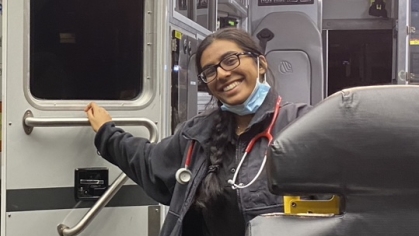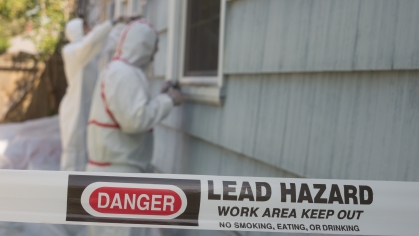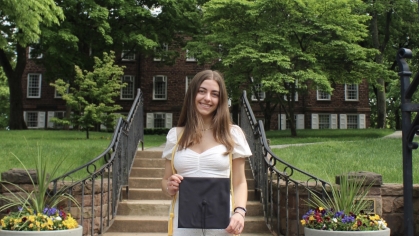
A study published in the Journal of Exposure Science and Environmental Epidemiology has found nearly all pregnant women ingest the fungal toxin zearalenone (ZEN), which mimics estrogen in the body and hinders reproduction in some animals.

A study published in the Journal of Exposure Science and Environmental Epidemiology has found nearly all pregnant women ingest the fungal toxin zearalenone (ZEN), which mimics estrogen in the body and hinders reproduction in some animals.

We're excited to continue our series highlighting the 2024–2025 Wellness PHirst Ambassadors!
Each ambassador is making a meaningful impact by promoting wellness and supporting their peers. In our last feature, we introduced Maya, sharing her passion for epidemiology and how she plans to connect with her peers as an ambassador.
In our next spotlight, we sat down with Rihi Jain, a Master of Public Health (MPH) student with a concentration in Global Public Health, to discuss her public health journey and the significance of promoting and leading with wellness PHirst.

Just living near gun violence – even without direct exposure or injury – significantly hurts quality of life, according to a study published in the Journal of Urban Health.

A review by a Rutgers Health expert shows that, despite decades of successful efforts to reduce lead exposure, the toxic metal still poses dangers in consumer products that warrant additional attention.

September is Suicide Prevention Month – a time to raise awareness of this urgently important crisis.
We sat down with Dr. Joye Anestis, a licensed clinical psychologist and associate professor in the Rutgers School of Public Health’s Department of Health Behavior, Society, and Policy, to discuss her suicide prevention research and work. Dr. Anestis also leads the school’s Population Mental Health concentration.

We're excited to continue our Q&A series highlighting the 2024–2025 Wellness PHirst Ambassadors!
Each ambassador is making a meaningful impact by promoting wellness and supporting their peers. In our last feature, we introduced Neha and her personal experiences in public health and beyond, emphasizing the importance of addressing mental health and stigma.
In our next spotlight, we sat down with Maya Governa, a Master of Public Health (MPH) student with a concentration in Epidemiology, to discuss her public health journey and the significance of promoting and leading with wellness PHirst.

Erica L. Eliason, Ph.D., M.P.H. has joined the Rutgers School of Public Health Department of Urban-Global Public Health as an assistant professor. She is also a member of the Rutgers Center for State Health Policy within the Rutgers Institute for Health, Health Care Policy and Aging Research.

As we honor National Hispanic Heritage Month, which is observed from September 15 to October 15, we celebrate Hispanic Americans’ histories, cultures, and contributions. Dr. Zorimar Rivera-Núñez is an assistant professor in the Rutgers School of Public Health’s Department of Biostatistics and Epidemiology and a proud Latina. Her journey - from navigating language barriers to leading groundbreaking research on environmental exposures and maternal health - is a testament to resilience, perseverance, and the power of heritage.